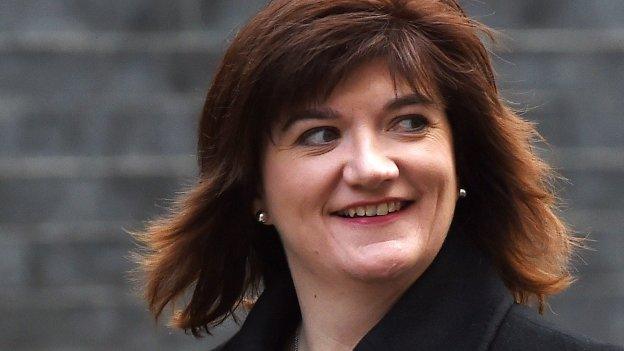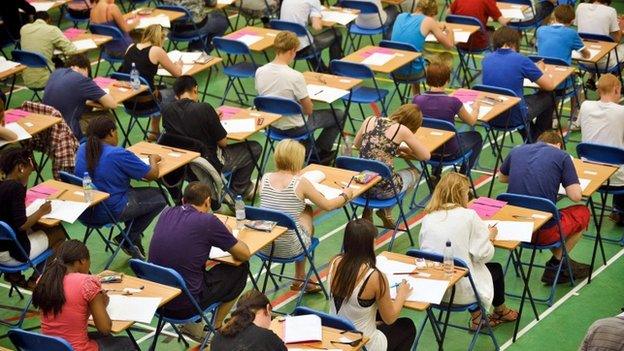Morgan tackles 'unfair' school funding
- Published

The plans aim to remove funding "oddities" - and councils would no longer distribute money
Education Secretary Nicky Morgan is pushing ahead with a "national funding formula" for schools, to tackle uneven levels of funding across England.
Mrs Morgan has launched a consultation to replace a system she says is "outdated, inefficient and unfair".
The funding shake-up will also remove local authorities from the process, with cash going directly to heads.
Labour has accused the government of "dodging difficult questions" about who will lose funding in the changes.
Mrs Morgan says schools need funding that "genuinely matches their need".
She says the plans will ensure money goes "straight to the frontline", but it will mark a further reduction in the link between local authorities and schools.
Changing needs
On Monday the education secretary has taken the next step towards introducing a new school funding formula in 2017-18, after complaints about local anomalies and spending gaps.

Nicky Morgan has launched a consultation on a funding formula to apply from next year
For example, pupils in Rotherham each receive £500 per year more in funding than those in Plymouth, even though they have similar levels of disadvantage.
In December, MPs led by former Education Select Committee chairman Graham Stuart presented a petition calling for change, saying the best-funded areas received up to £6,300 per pupil per year, while the worst-funded received £4,200.
The government has a manifesto pledge to create a more consistent way to distribute more than £40bn per year of the core schools budget - and says it wants to end funding rates based on "oddities of history".
Further details were announced in the Chancellor's Autumn Statement, with the promise of a national rate for each pupil, with extra funding for those with additional needs.
Russell Hobby, leader of the National Association of Head Teachers, backed the principle of a fairer redistribution of funding.
He also supported a "big shift" in more money going directly to schools.
But he warned that there would be both "winners and losers" under a new funding regime and there was still "scant detail" about how this would be decided.
There have been warnings that some schools will lose out, particularly in inner London.
Christine Blower, leader of the National Union of Teachers, said the proposals would "impose huge funding cuts on many schools unless additional funding is made available. Schools are already suffering real terms cuts to per pupil funding".
Malcolm Trobe, interim general secretary of the ASCL head teachers' union, backed the principle of a change to funding arrangements.
"However simply redistributing the current pot of money is not enough on its own to address the significant real-terms cuts currently hitting school budgets. Greater investment is needed," said Mr Trobe.
The Department for Education says the current system is out of date and no longer reflect levels of need.
It says that in the past 10 years, the proportion of pupils eligible for free school meals has doubled in Lincolnshire and nearly halved in Southwark.
The education department says that for the new funding formula there will be a basic level of per pupil funding, with extra support allocated depending on need, such as high levels of deprivation or for schools in high-cost areas.
For local authority schools, including the majority of primary schools, there will be a two year transition period, in which funding will cease to be distributed through councils.
Councils will have a funding role in areas with "high-level special educational needs", but will no longer be involved as a channel for basic funding for schools.
Roy Perry, chairman of the Local Government Association's children and young people board, said: "Councils know their areas best, and currently work in partnership with head teachers and governors to set local funding formula which allows local needs and priorities to be addressed.
"We'd want to see this local conversation continue, rather than having all school budgets set in Whitehall."
Academy schools and trusts already receive funding through the government's Education Funding Agency.
Labour's shadow education secretary Lucy Powell says that for a national funding formula "the devil will be in the detail" and claimed that the government was stalling on revealing where schools would have reduced levels of funding.
She also warned that the overall schools budget would see a real-terms spending cut, which would have a "huge impact".
But Mrs Morgan said the changes would provide a fairer allocation of resources.
"We want every school in England to get the funding it deserves, so that all children - whatever their background and wherever they live in the country - get a great education."
- Published25 November 2015

- Published2 December 2015

- Published18 November 2015
